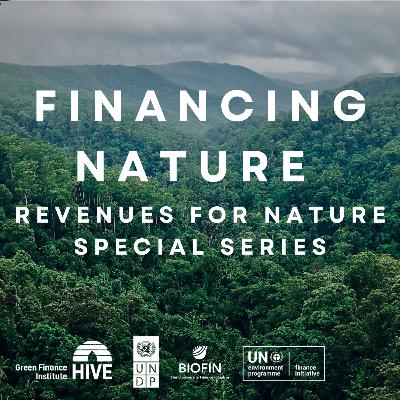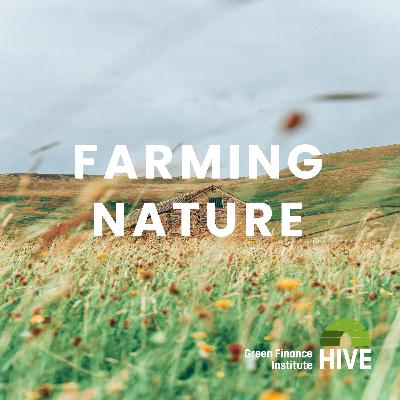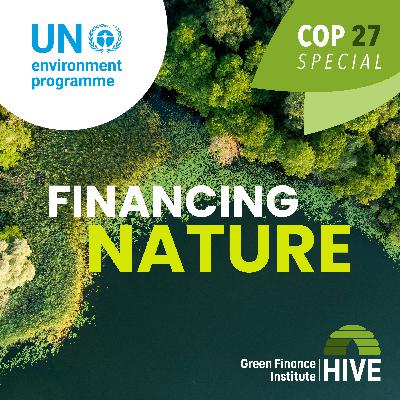Discover Financing Nature
Financing Nature

Financing Nature
Author: Green Finance Institute
Subscribed: 45Played: 632Subscribe
Share
© Green Finance Institute
Description
How can we mobilise investment into nature restoration? Financing Nature from GFI Hive aims to better understand how we can unlock private sector investment into nature restoration and nature-based solutions, and move towards a nature-positive economy. Each episode features interviews with leaders in finance, policy and the environment to discuss solutions. Hosted by the Green Finance Institute's Helen Avery.
49 Episodes
Reverse
In this second episode, Helen Avery is joined by Elizabeth Beall, Managing Director of Finance Earth to discuss supply chain models including the Fisheries Improvement Fund (FIF) and how it can be replicated and scaled. The FIF brings together actors across the entire seafood supply chain to fund the full costs of a Fishery Improvement Project or wider fishery improvements. The investment is then re-paid by a volume-based fee paid by supply chain actors.
In this episode, Helen Avery is joined by Pedro Moura Costa, founder of Sustainable Investment Management (SIM) and BVRio, to discuss the Responsible Commodities Facility (RCF), and how it can be replicated and scaled. RCF provides a financially sustainable vehicle that incentivises soy farmers in Brazil, and helps meet the growing international demand for zero-deforestation supply chains.
From January 2024 to the end of March 2024, GFI's Financing Nature podcast is becoming Farming Nature - a series of audio interviews designed to support UK farmers in understanding nature markets as part of the newly-launched Farming Toolkit on GFI Hive.
In this episode, Timothy Coates, co-founder of Oxbury Bank and third generation farmer shares why he is adapting his farm ready to sell units and credits, his views on pricing and 'no regrets' decisions and his work with the Northeast Cotswolds Farmer Cluster.
Financing Nature will be making its revamped return in April 2024 interviewing representatives from project developers, policy makers and financial institutions around the world in the lead up to COP16.
In this episode of Financing Nature in partnership with the United Nations Environment Programme for COP15 in Montréal, we speak to those on the ground to hear why they have come, what they are hoping for from the negotiations on the crucial Global Biodiversity Framework, and their own work in halting and reversing biodiversity loss by 2030. Topics cover the Taskforce on Nature-related Financial Disclosures (TNFD) and data; financial sector engagement; business engagement and the role of subsidies; indigenous peoples and local communities; and the role of governments and public sector finance.
Guests include representatives from the TNFD, NatCap Research, Finance for Biodiversity Foundation, Federated Hermes, Schroders, the World Business Council for Sustainable Development, Nestlé, Junglekeepers and UNEP FI.
In this special episode at the start of COP15 in Montreal in partnership with the United Nations Environment Programme, guests Elizabeth Mrema, Executive Secretary, and David Ainsworth, Information Officer, at the UN Convention on Biological Diversity join the Green Finance Institute's Helen Avery. Together they share what we need to see over the 12 days of the Conference including within the Global Biodiversity Framework and its targets, commitments to reduce harmful subsidies, and greater actions to increase financial flows for nature restoration and protection.
In this final episode of our COP27 Special Series with the United Nations Environment Programme, we are joined from UNEP's Ecosystems Division by Susan Gardner, Head of the Ecosystems Division and Ivo Mulder, Head of the Climate Finance Unit. Susan and Ivo wrap up the series by sharing what they hope to see happen at COP27 and the actions we collectively need to take to ensure that nature restoration and nature-based solutions receive the investment they urgently require.
Over 70% of the planet's surface is cover with water, yet when it comes to protecting and restoring oceans health, finance is sorely missing. Indeed, only 0.01% of all climate finance is invested into marine and coastal nature based solutions. In this fourth episode of the Financing Nature COP27 Special Series with UNEP, Karen Sack, executive director at the Ocean Risk and Resilience Action Alliance, and Yabanex Batista, Deputy Head of the UN's Global Team for the Global Coral Reef Fund, discuss the role of coastal communities and our seas in climate mitigation and adaptation, and what we need to see to mobilise greater investment.
Africa, host to COP27, is also host to 30% of the world's biodiversity. It is also a continent on an accelerated economic growth trajectory. This episode, guests Kaddu Sebunya, CEO, African Wildlife Foundation and David Cheboryot, Director of Entrepreneurship Centres – Africa - E4Impact Foundation share how economic growth, community development and conservation can go hand in hand, and how private finance and the private sector can play their role. Finally, the guests discuss their hopes for COP27 from governments.
In our second episode of Financing Nature's special series with UNEP, Andrew Deutz, Director of Global Policy, Institutions and Conservation Finance at The Nature Conservancy shares the need to mobilise government and development bank aid into nature restoration projects, and the role of guarantees and insurance, and Yasmine Sagita, Chief of People, Sustainability and Corporate Affairs at rubber company, PT Royal Lestari Utama (RLU) discusses the Tropical Landscape Finance Facility (TLFF) which was funded by the world's first sustainability bond.
In this first episode of Financing Nature's COP27 Special Series from the Green Finance Institute and United Nations Environment Programme, we explore how the finance sector can reduce deforestation and finance reforestation, and frame up what we need from global leaders at COP27. Helen Avery speaks with Champions Finance Lead, Sagarika Chatterjee, about the work of the Glasgow Financial Alliance for Net Zero (GFANZ) and global commitments and solutions, and José Pugas, head of responsible investments and engagement at JGP Asset Management in Brazil shares with Jessica Smith the work of IFACC (Innovative Finance for the Amazon, Cerrado and Chaco) and the needs of the Global South.
In this episode, we dive into the U.S. mitigation banking market as part of our ongoing exploration of compliance models and regulated markets. Helen Avery is joined by Adam Davis, co-founder and managing partner of Ecosystem Investment Partners (EIP), a private equity firm that has raised over $1 billion and restored more than 53,000 acres of wetlands and 260 miles of streams across the U.S. since 2007.Adam shares an in-depth look at what’s actually happening on the ground. He walks us through how EIP set up mitigation banks - from identifying suitable locations to developing and selling credits. Adam also shares key insights into investor appetite, and what’s driving increased interest in nature-based investment opportunities. The episode also explores what has enabled the U.S. mitigation banking market to scale as it has, with some of the key lessons learned, why it remains attractive to investors, and how other countries could replicate its success.
In this episode, we’re joined by Tim Male, Founder and Executive Director of the Environmental Policy Innovation Center (EPIC), to dive into U.S. mitigation banking and the broader role of regulatory markets. The U.S. is home to the one of the world’s largest regulatory markets, where billions of private-sector dollars are flowing into nature restoration. In this episode we talk about why these models and markets are essential for getting capital moving towards nature.For listeners who want to learn more about U.S. mitigation banking, check out the R4N Guidebook, co-written with EPIC. It explores how the model was created, the challenges it faces, and key lessons learned along the way.
In this episode Helen Avery is joined by Thomas Pickford, UK Partnerships and Policy Lead at The Nature Conservancy (TNC) and Glenn Anderson, Co-Founder and Strategy Lead at the Wendling Beck - a landscape scale project which has been selling Biodiversity Net Gain (BNG) units in the UK. In this episode they talk about the BNG market, what it is, how it works and the implications for the EU. They also discuss what this looks like for farmers and land mangers who are engaging with BNG. For those interested in the Wendling Beck Project’s development, the GFI Hive has also written a detailed set of case studies, all found on the GFI Hive Investment Readiness Toolkit: https://hive.greenfinanceinstitute.com/gfihive/toolkit/projects/wendling-beck/
In this episode Emily McKenzie joins us on Financing Nature to share how we move from disclosures into action. She shares where the TNFD is to-date on working with businesses and financial institutions around the world, differences in regional approaches, transition plans and the road to investment.
In this episode, Helen Avery speaks with Tom Curtis, founding partner at 3Keel and Landscape Enterprise Networks about the LENs model that brings together businesses to pay farmers for environmental outcomes across a shared landscape.
In this episode, Vanessa Garcia at Terrassos shares about mitigation banking in Colombia and their model of establishing habitat banks to provide biodiversity units into that market.
In this fourth episode, Helen Avery is joined by Michal Zrust, Founder and CEO of Lestari Capital to discuss the Rimba Collective, a financial mechanism that supports companies to finance a portfolio of forest conservation and restoration projects across Southeast Asia. Rimba Collective members make payments that are proportionally linked to the amount of palm oil procured. In return for funding the projects, participating companies can claim against the environmental outcomes for their sustainability commitments and supply chain resilience.
In this third episode, Helen Avery is joined by Nicolas Pascal, Founder of Blue Alliance to explore its innovative model that creates local reef-positive business rooted in the blue economy. These social enterprises then direct a portion of their profits toward the management of Marine Protected Areas (MPAs) – helping MPAs to become financially self-sustaining.
Join us for this special episode of our mini-series, Farming Nature, as Archie Ruggles-Brise shares his experience and advice on preparing for Biodiversity Net Gain. We also hear about interventions across his Essex farm such as the introduction of beavers for flood management. This episode is designed to support farmers working through Milestone 5 of our Farming Toolkit. Our regular podcast, Financing Nature, will return in April 2024.
On October 5th, The United Nations Environment Programme (UNEP) and Green Finance Institute (GFI) will launch a five-episode special series of Financing Nature in the lead up to COP27. Each episode will showcase a project on the ground in the Global South, and interviews with leading figures in the world of finance and nature to discuss what we need from our global governments in Egypt this November.














